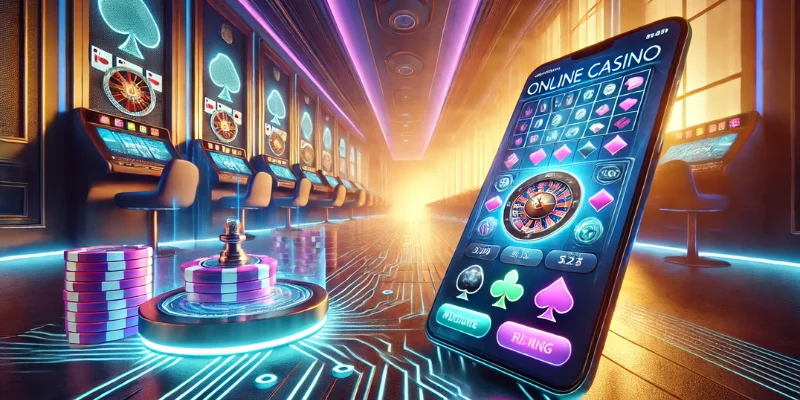Technological Innovations Driving Live Poker
As an experienced casino player in the Philippines, I’ve seen firsthand how the online gaming world has transformed over the years. One of the most impressive advancements has been in Live Poker iGaming, where technology plays a significant role in creating immersive and secure experiences. The evolution of real-time streaming and advanced algorithms has reshaped the landscape, offering players more interactive, reliable, and authentic poker sessions than ever before. Here’s how these technological innovations have impacted the live poker scene.
Real-time Streaming and Its Impact on Player Immersion
1. The Shift to High-Definition Streaming
Real-time streaming has taken online poker from simple, animated simulations to vibrant, interactive experiences that closely replicate the excitement of a physical casino.
- High-Definition Video Quality: Live Poker iGaming platforms now use high-definition (HD) video streams to deliver crystal-clear visuals. Players see the dealer and the table as if they were right there in a brick-and-mortar casino. This level of detail enhances trust, as players can observe every shuffle, deal, and gesture.
- Multiple Camera Angles: Advanced streaming setups often use multiple cameras to capture the action from various angles. Whether it’s a close-up of the dealer’s hands as cards are dealt or a wide-angle view of the table, these perspectives provide a comprehensive look at the game and boost player confidence.
- Low Latency for Real-time Interaction: The technology ensures minimal delay, allowing players to interact with the dealer and other participants seamlessly. This real-time engagement helps maintain the momentum of the game and enriches the overall experience.
2. The Role of Streaming Technology in Enhancing Realism
The realism in Live Poker iGaming is further amplified by advanced streaming technology that mimics the casino atmosphere.
- Professional Studio Environments: Live poker games are broadcast from dedicated studios designed to replicate actual casino settings. The professional setup includes luxurious tables, subtle lighting, and high-quality audio equipment that contribute to an immersive ambiance.
- Dealer Interaction and Engagement: Streamed live dealers aren’t just robotic figures; they’re trained to engage with players through friendly conversations and commentary. They greet players by name and react in real-time to chat messages, creating a more personalized and engaging experience.
- 3D and Augmented Reality (AR) Integration: Some platforms are beginning to experiment with 3D visuals and AR overlays, adding another layer of depth to the game. Players can view interactive statistics or use AR to simulate their own chips and cards.
3. The Benefits of Immersive Streaming for Players
Real-time streaming provides benefits that keep players coming back for more.
- Transparency in Gameplay: Watching the dealer live and observing every action in real time fosters trust. Players can be sure that the game is fair, with no hidden tricks or computer-generated outcomes.
- Social Interaction and Community Feel: The real-time nature of streaming allows players to chat with each other and the dealer. This social aspect mimics the camaraderie found in physical poker rooms, fostering a sense of community among online players.
- Consistent Engagement: High-quality streaming, paired with real-time interaction, keeps players engaged for longer sessions. The thrill of watching the game unfold live adds a level of excitement that static or animated games can’t match.
 The Use of Live Poker Advanced Algorithms and Secure RNGs
The Use of Live Poker Advanced Algorithms and Secure RNGs
1. Enhancing Fair Play with RNGs
At the heart of any trustworthy online poker game lies the Random Number Generator (RNG), a technology that ensures fairness and unpredictability in gameplay.
- Certified RNG Systems: Live Poker iGaming platforms rely on certified RNGs to manage card shuffling when real cards are not in play. Certification by independent bodies such as eCOGRA or iTech Labs assures players that these algorithms are unbiased and transparent.
- Simulating True Randomness: RNGs are designed to mimic the randomness of a physical card shuffle. Each shuffle is unique and independent, ensuring that no player can predict or influence the outcome of the game.
- Protection Against Manipulation: Advanced algorithms in RNGs prevent any form of tampering, whether from players trying to game the system or from unauthorized third parties. This security is essential for maintaining player trust.
2. AI-Powered Enhancements for Player Experience
Algorithms go beyond RNGs in Live Poker iGaming to provide features that enhance gameplay and protect players.
- AI-Powered Dealer Assistance: Artificial Intelligence helps live dealers manage large player pools, track game progress, and ensure that the game flows smoothly. This makes the gameplay experience more efficient without sacrificing human interaction.
- Personalized Gameplay Suggestions: Some platforms use AI algorithms to offer tips and strategy suggestions to players. These insights can help beginners improve their skills or offer seasoned players new approaches to refine their tactics.
- Real-time Game Analysis: Advanced algorithms can analyze game data in real-time to identify patterns or potential issues, ensuring that the game remains fair and balanced.
3. Data Security and Privacy Measures
The integration of advanced algorithms and RNGs in Live Poker Goes Big goes hand-in-hand with ensuring player data is secure.
- Encryption and Data Protection: Online poker platforms use state-of-the-art encryption protocols to protect player data. Advanced algorithms ensure that personal and financial information is kept private and secure from unauthorized access.
- Secure Game Servers: RNGs and other algorithmic functions are hosted on secure servers with multiple layers of protection. This setup prevents hacking and ensures that gameplay is not affected by third-party tampering.
- Regular Software Audits: Leading Live Poker iGaming platforms frequently undergo audits by third-party agencies to verify that their software and algorithms remain up-to-date and fair. These audits provide players with confidence that the game is conducted transparently.
4. The Advantages of Algorithmic Integration for Players
Players benefit from the use of advanced algorithms in several ways.
- Consistency and Fairness: Algorithms ensure that the game remains consistent across sessions, preventing any bias or unfair advantages. This consistency builds player confidence and keeps the platform trustworthy.
- Efficient Gameplay: Algorithms automate aspects of the game, such as shuffling and dealing, making the game faster without sacrificing accuracy. This efficiency allows for more hands per session, enhancing the overall gaming experience.
- Adaptive Difficulty Levels: Some platforms use adaptive algorithms that adjust game difficulty based on a player’s skill level. This creates a balanced playing field, making the experience enjoyable for both beginners and seasoned pros.
The Future of Technological Innovation in Live Poker iGaming
1. Emerging Technologies on the Horizon
The future of Live Poker iGaming promises even more immersive and secure experiences through technological advancements.
- Virtual Reality (VR) Integration: Platforms are experimenting with VR to offer players a fully immersive poker room experience. With VR, players can simulate the feeling of sitting at a real poker table, complete with virtual hand movements and interactions.
- Blockchain Technology: Blockchain is being explored as a means to enhance transparency further. The decentralized nature of blockchain could ensure that game outcomes are permanently recorded and verified, making cheating virtually impossible.
- AI-Driven Dealer Improvements: While current AI assists dealers, future implementations may include fully autonomous, lifelike AI dealers capable of holding conversations and adapting their behavior based on player feedback.
2. Challenges and Considerations
While the benefits are clear, there are challenges that come with these technological advances.
- High Bandwidth Requirements: Advanced streaming and immersive technologies require reliable high-speed internet, which may not be accessible in all regions of the Philippines. Solutions such as data-light versions of the platform may be needed.
- Keeping Up with Security Threats: As technology advances, so do the methods that malicious actors use. It’s crucial for Live Poker iGaming platforms to stay ahead by constantly updating their security protocols.
- Balancing Automation with Human Touch: While AI and algorithms improve efficiency, maintaining the human touch that players enjoy is essential. Striking the right balance between technological assistance and personal interaction is key.
 Live Poker Virtual Lobbies and Community-Building Opportunities
Live Poker Virtual Lobbies and Community-Building Opportunities
1. The Concept of Virtual Lobbies
Virtual lobbies are the digital equivalent of waiting rooms or social spaces in physical casinos similar to SA Gaming. They provide players with a place to gather, chat, and explore game options before joining a poker table.
- Central Hubs for Interaction: These lobbies serve as a central space where players can meet, converse, and even form alliances or friendly rivalries. Unlike solitary gameplay, this shared space brings an element of social interaction that enhances the gaming experience.
- Accessible Interface: In Live Poker iGaming, virtual lobbies are designed to be user-friendly and intuitive. Players can easily browse through active tables, join games, or participate in discussions. This design ensures that even newcomers can navigate the lobby and engage with others.
- Themed Lobbies: Some platforms offer themed lobbies that align with popular events, holidays, or promotions. These special settings create an exciting environment where players feel more immersed in their surroundings, fostering a greater sense of community.
2. Features That Build Community in Virtual Lobbies
To keep players engaged and connected, virtual lobbies are equipped with a range of interactive features.
- Group Chats: Chat functions within lobbies allow players to communicate with each other in real-time. These chats often serve as spaces where players share strategies, discuss previous game outcomes, or even exchange casual banter.
- Player Profiles and Statistics: Some lobbies enable players to create profiles and view others’ basic stats, such as recent wins or favorite poker variations. This feature adds a layer of familiarity and makes the environment feel more like a community.
- Game Recommendations: The lobby interface often provides tailored game suggestions based on a player’s preferences or recent activities. These recommendations are conversation starters, prompting players to discuss which games they enjoy most and why.
3. Creating Friendships and Rivalries
Virtual lobbies are more than just waiting areas—they’re where connections are formed.
- Building Friendships: Players who regularly visit the same lobbies often get to know each other. Shared experiences, whether in a friendly game or a tense tournament, help create bonds that extend beyond the screen.
- Healthy Rivalries: Competitive spirit is part of poker, and virtual lobbies make it easy for players to challenge each other or recount memorable hands from previous matches. These rivalries add excitement and a sense of continuity to gameplay.
- Community Events and Group Challenges: Some platforms host community events within the lobby, such as mini-games or group challenges. These activities encourage players to work together or compete as teams, enhancing the social aspect of Live Poker iGaming.
The Role of Real-Time Interaction with Dealers and Players
1. Elevating the Gameplay Experience
Real-time interaction is a crucial element that sets Live Poker iGaming apart from traditional online poker.
- Live Dealer Engagement: Dealers are not just there to manage the game; they play a central role in creating an interactive and enjoyable atmosphere. Players can communicate with the dealer through chat, making the experience feel more personable and real.
- Dealer Personalities: Each dealer brings their unique personality to the table, from their way of speaking to how they respond to players. This variety keeps sessions fresh and interesting, making players feel more connected to the game.
- Verbal Acknowledgements: Dealers often address players by name, respond to questions, or comment on significant game moments. This small touch adds a layer of immersion that static online poker cannot replicate.
2. Interaction with Fellow Players
Engaging with other players during a live poker session contributes significantly to the overall gaming experience.
- Shared Reactions: The ability to share reactions during pivotal game moments, such as a high-stakes bluff or a surprising turn, makes gameplay more engaging. These shared experiences help replicate the communal feeling of being at a real poker table.
- Emotes and Quick Responses: Some platforms offer emotes and quick response features that players can use to express emotions, whether it’s celebrating a win or reacting to a bold move. These elements add an extra layer of interaction without disrupting the flow of the game.
- Private Messaging: In addition to group chats, private messaging options allow players to talk one-on-one. This is ideal for friends who join the same game or for forming strategic alliances during certain poker variations.
3. Encouraging Strategic Discussions
Real-time interaction isn’t just for socializing; it can also be a tool for strategic discussions.
- Discussing Game Strategies: Players can use the chat function to discuss strategies or suggest potential moves. While direct strategy talk may be limited during competitive games, post-game chats often involve in-depth analyses and sharing of poker tips.
- Learning from Peers: Newer players benefit from observing conversations between more experienced players. This kind of interaction provides a learning opportunity and helps them improve their skills over time.
- Game Observers: Some platforms allow players to join as observers, where they can interact with others watching the game. This creates a lively atmosphere even for those not participating directly, fostering a broader sense of community.
4. Real-Time Feedback and Adaptability
Real-time interaction also provides opportunities for players to receive immediate feedback and adapt their gameplay.
- Dealer Tips and Insights: Dealers often offer light commentary on gameplay, which can include tips for less experienced players. These insights, though subtle, can help players adapt and refine their strategies in the moment.
- Player Feedback: Players can share their thoughts or experiences during the game, giving real-time feedback that can be considered for future platform updates. This interaction ensures the game evolves in response to player needs.
- Dynamic Game Adjustments: Some games include dynamic adjustments based on player interaction, such as extending game timers if players are actively engaged in discussions. This adaptability makes the experience more user-centric.
 Advantages of Social Features in Live Poker iGaming
Advantages of Social Features in Live Poker iGaming
1. Enhanced Player Retention
The integration of social features contributes significantly to player retention and satisfaction.
- Increased Playtime: Players are more likely to stay longer when they feel connected to others, be it through chatting with the dealer or participating in group discussions. This engagement transforms a casual gaming session into a more memorable experience.
- Player Loyalty: Social bonds formed through virtual lobbies and in-game interactions encourage players to return to the platform regularly. The sense of belonging to a community adds a reason to log in beyond just playing the game.
- Shared Achievements: Celebrating wins and milestones with other players fosters a supportive community. These shared moments increase the fun and make players feel valued.
2. Attracting New Players
Social interaction features are also a powerful tool for attracting new players to Live Poker iGaming.
- Word-of-Mouth Promotion: Players who enjoy their interactive experiences are more likely to invite friends to join. This type of organic growth helps expand the player base and adds to the community feel.
- Interactive Tutorials: New players are more inclined to join when they know that interactive features, such as real-time chat and advice from dealers or other players, are available to support them as they learn the ropes.
- Welcoming Environment: The presence of chat functions and player interactions can make the platform feel welcoming and less intimidating for newcomers.
3. Elevating the Game Beyond Cards
The social aspect adds depth to the live poker experience, making it more than just a card game.
- Entertainment Value: The ability to interact with both dealers and fellow players turns a standard poker game into an entertaining event. The banter, discussions, and reactions make each session unique and enjoyable.
- Social Capital: Players who actively engage and contribute positively to discussions build their reputation within the community. This social capital can translate to respect and recognition among peers, enhancing their gaming experience.
- Maintaining a Positive Atmosphere: Regular players often contribute to maintaining a positive and respectful atmosphere, helping new and seasoned players alike feel more at ease.
Educational Tools and Tutorials for New Players
1. Interactive Tutorials to Introduce the Basics
For beginners, jumping into live poker can feel intimidating. To counter this, Live Poker iGaming platforms offer interactive tutorials that guide players through the fundamentals.
- Step-by-Step Guides: New players can access tutorials that break down the rules of different poker variants, from Texas Hold’em to Omaha. These guides often include interactive elements, such as clickable examples and visual explanations, which help users grasp the basics more quickly.
- Hands-On Practice Modes: Some platforms feature practice tables where players can engage in mock games without the pressure of real stakes. These practice sessions are designed to mimic live games, enabling beginners to apply what they’ve learned in tutorials without fear of losing money.
- Video Tutorials and Live Demos: Video content is particularly effective for learning poker. High-quality videos led by professional players or casino dealers demonstrate key moves and strategies. Live demos often include Q&A sessions, allowing viewers to clarify doubts in real-time.
2. Structured Learning Paths
Effective learning tools go beyond simple tutorials and provide a structured path for progression.
- Tiered Learning Modules: Many Live Poker iGaming platforms offer learning modules divided into beginner, intermediate, and advanced sections. Players can start with foundational lessons and progress as they gain confidence and skill.
- Achievements and Skill Badges: To motivate learners, platforms sometimes include badges or rewards for completing lessons or reaching skill milestones. This gamified approach keeps players engaged while they learn.
- Interactive Quizzes: Quizzes embedded in tutorials test a player’s understanding of the material. These quizzes help reinforce learning and allow players to identify areas where they need more practice.
3. Community-Driven Learning Platforms
Learning doesn’t always come directly from tutorials; community interaction also plays a role.
- Player Forums and Discussions: Many poker sites include forums where players can ask questions and share insights. Newcomers benefit from the shared knowledge of more experienced players, creating a collaborative learning environment.
- Guided Playthroughs with Mentors: Some platforms offer guided playthroughs where professional or highly-skilled players provide commentary on their moves during a live game. This guidance helps new players understand the reasoning behind specific actions.
- Feedback Mechanisms: Players can upload their gameplay for feedback from the community. This peer review system provides new players with valuable insights on how to improve their game strategy and decision-making.
In-Game Tips and Advanced Strategy Features
1. Real-Time Tips and Assistance
Once players are comfortable with the basics, in-game tips help them make more informed decisions during live sessions.
- Contextual Tooltips: During a game, players can access tooltips that explain poker terminology, hand rankings, or recommended actions based on their current hand. These pop-ups are unobtrusive but readily available when needed, assisting players without breaking the flow of the game.
- Odds Calculators: Some Live Poker iGaming platforms feature integrated odds calculators that estimate a player’s chances of winning based on their hand and the cards on the table. These calculators are invaluable for new players learning the nuances of probability and decision-making.
- Move Recommendations: In certain game modes, platforms may offer move recommendations, suggesting when to fold, check, or raise based on common strategies. While these tips don’t guarantee a win, they guide new players in developing a strategic mindset.
2. Advanced Analytics for Experienced Players
For more seasoned players, advanced analytics tools are essential for fine-tuning strategies and staying competitive.
- Hand History Review: Platforms often include a feature that allows players to review their hand history, examining past decisions and their outcomes. This tool is essential for self-assessment and helps players identify patterns that could inform future play.
- Opponent Profiling: Advanced features might include the ability to profile opponents based on their gameplay patterns. While not invasive, these profiles track tendencies such as aggressive betting or frequent bluffing. Experienced players use this data to adapt their strategies and gain an edge.
- Bet Tracking and Analysis: In-game analysis tools can display a player’s betting patterns and highlight any tendencies they may not have noticed. This helps players adjust their strategies to become less predictable and more adaptable.
3. Strategy Playbooks and Training Programs
For those who want to push their skills further, comprehensive strategy playbooks and training programs are often available.
- Digital Strategy Guides: Platforms provide downloadable or in-game guides that cover advanced strategies, such as reading an opponent’s bluff or playing effectively with a short stack. These guides are written by poker professionals and tailored for players looking to step up their game.
- Live Training Sessions: Advanced players often benefit from live training sessions hosted by poker pros. These sessions delve into complex topics like pot odds, table position strategy, and bluffing techniques. Players can watch and ask questions, making these sessions interactive and highly educational.
- Simulated High-Stakes Games: Some platforms offer high-stakes simulation games where players can test their strategies without financial risk. This mode allows experienced players to experiment with different tactics and refine their skills before entering real-money games.
 Benefits of Skill Development Features in Live Poker iGaming
Benefits of Skill Development Features in Live Poker iGaming
1. Accelerating the Learning Curve
The availability of tutorials, practice modes, and in-game tips accelerates the learning process for new players.
- Building Confidence: By practicing in a low-risk environment and accessing real-time guidance, new players can build confidence in their abilities. This confidence translates into a smoother transition to higher-stakes games.
- Reduced Intimidation: Poker can be intimidating for beginners, especially in a live setting. Educational tools help reduce this intimidation by providing a safety net of knowledge that players can fall back on.
- Immediate Application: Players can immediately apply what they learn from tutorials and tips during their next live game, solidifying their understanding and improving their performance.
2. Enhancing Long-Term Player Engagement
Skill development features don’t just attract new players; they keep experienced players coming back.
- Ongoing Challenges: Advanced strategy tools and training programs keep seasoned players engaged by providing new challenges to master. This ongoing learning process ensures that players don’t become bored with repetitive gameplay.
- Retention Through Improvement: Players are more likely to continue playing if they see tangible improvement in their skills. Platforms that offer opportunities for growth foster a sense of progress, leading to higher retention rates.
- Community Learning: Features that encourage community participation, such as forums and feedback systems, create a culture of shared learning. This environment benefits all players, from beginners to experts, and strengthens the community.
3. Building a Competitive and Skilled Player Base
A well-educated player base benefits both the platform and its users.
- More Exciting Games: Games become more exciting when participants understand advanced strategies and can execute them effectively. This level of play raises the stakes and makes games more challenging and enjoyable.
- Attracting High-Level Players: Platforms that provide educational resources and skill development opportunities are more likely to attract high-level players who appreciate the competitive environment.
- Balanced Competition: By equipping players with the tools they need to learn and grow, the platform ensures a more balanced competition. This balance encourages fairness and makes games engaging for everyone involved.
Hosting Local and International Live Poker Tournaments Online
1. The Rise of Online Poker Tournaments in the Philippines
Online poker has grown immensely popular in the Philippines, thanks to its convenience and accessibility. The trend has only accelerated with the introduction of live poker tournaments that cater to both local and international players.
- Local Tournaments for Filipino Players: Platforms hosting tournaments specifically for Filipino players create opportunities for local talent to shine. These tournaments often feature gameplay times that align with local schedules and use culturally familiar themes and interfaces, making them more appealing.
- International Competitions: Participating in international tournaments allows Filipino players to test their skills against global competitors. This exposure helps them gain experience and grow as more strategic and adaptive players.
- Integration of Live Streaming: Tournaments are frequently broadcast with live streaming technology, allowing players to follow games in real-time. This feature adds to the excitement and engagement, letting non-participants observe gameplay and learn from advanced strategies employed by top players.
2. Accessibility and Participation
Hosting tournaments online has broken down barriers that previously limited participation in physical poker events.
- Joining from Anywhere: Players can participate from the comfort of their homes or while on the go. This flexibility means more players can join in, regardless of their location within the Philippines or beyond.
- Low Entry Barriers: Online tournaments often come with varied buy-in levels, making it possible for both casual players and serious competitors to join. Some tournaments even offer freerolls, allowing players to enter without paying a fee and compete for real prizes.
- Multiple Formats: Platforms may host different formats, such as Sit & Go tournaments, multi-table tournaments (MTTs), or knockout-style games. This variety caters to different preferences and keeps gameplay exciting.
3. Leveraging Technology for Enhanced Play
Technology plays a vital role in ensuring that online tournaments run smoothly and fairly.
- Automated Tournament Management: Advanced software organizes seating, blind structures, and progression without manual intervention. This automation makes the process seamless for both players and organizers.
- Integrated Security Measures: Platforms use encrypted connections and multi-layered authentication to prevent fraud and ensure the integrity of the game. This security is crucial in competitive environments where high stakes are involved.
- Live Dealer Support: Some high-profile tournaments include live dealers who manage the game and interact with players, blending the thrill of real-life poker with the convenience of online play.
Prize Pools That Attract Diverse Players and Enhance the Gaming Ecosystem
1. The Allure of Significant Prize Pools
One of the most enticing aspects of Live Poker iGaming tournaments is the prize pool. Substantial prizes draw in diverse participants and keep the competition fierce.
- Guaranteed Prize Pools: Many online poker platforms advertise guaranteed prize pools, promising players a set amount regardless of the number of participants. This assurance draws in players seeking lucrative opportunities.
- Progressive Jackpots: Some tournaments feature progressive jackpots that increase as more players join. This dynamic prize structure creates excitement and encourages more sign-ups, further fueling competition.
- Seasonal and Themed Events: Prize pools often expand during special events or seasonal tournaments, such as during holidays or poker festivals. These events attract a broader range of participants, from amateur enthusiasts to professional players.
2. Encouraging New and Diverse Player Participation
Big prize pools don’t just appeal to professionals; they also attract newcomers and semi-professional players eager to test their skills.
- Freeroll Tournaments: Free entry tournaments with real cash prizes offer newcomers a chance to compete without risking money. These tournaments help build confidence and experience, encouraging new players to explore more competitive games in the future.
- Scaled Prizes: Structured prize pools that reward a larger number of players (not just the top finishers) make participation more appealing. This distribution strategy provides more players with a taste of winning, boosting overall enthusiasm and engagement.
- Diverse Player Base: With the promise of attractive prize pools, players from various backgrounds—students, part-time players, and seasoned pros—come together, enriching the poker ecosystem with different playstyles and experiences.
3. Boosting the Online Poker Ecosystem
The ripple effect of hosting high-stakes tournaments with substantial prize pools is felt throughout the entire poker ecosystem.
- Increased Player Retention: Players are more likely to stay on a platform that offers consistent, exciting tournaments. Regularly scheduled events help create a routine that players look forward to, contributing to long-term retention.
- Higher Competition Levels: Larger prize pools tend to attract more skilled players, which raises the standard of competition. This increase in quality challenges all participants to improve their gameplay, creating a more compelling environment.
- Media and Sponsorship Attention: High-profile tournaments with significant prize pools often catch the attention of media outlets and potential sponsors. This coverage can boost the profile of the platform and attract more players.
4. The Impact on Player Skill Development
Competing in tournaments with significant stakes encourages players to hone their skills and develop new strategies.
- Adapting to High-Pressure Situations: Large prize pools create high-pressure scenarios that test a player’s mental fortitude and strategic thinking. These situations help players become more resilient and adaptable in future games.
- Learning from High-Level Play: Watching or participating in tournaments with top-tier players provides valuable learning experiences. Observing the decisions and tactics used by professionals can inspire participants to refine their strategies.
- Post-Tournament Analysis: Many players analyze their performance after a tournament to identify mistakes and areas for improvement. This analysis is crucial for growth and is often motivated by the desire to compete more effectively in future events.
 Live Poker Challenges and Considerations in Hosting Tournaments
Live Poker Challenges and Considerations in Hosting Tournaments
1. Ensuring Fairness and Compliance
While tournaments are generally a positive feature, ensuring fairness and adhering to regulations is essential.
- Anti-Collusion Measures: Platforms implement measures to prevent collusion, where players work together to gain an unfair advantage. Monitoring tools and strict penalties help maintain the integrity of the game.
- Regulatory Compliance: Platforms must adhere to local and international gaming regulations to host tournaments. Ensuring compliance can be complex but is vital for maintaining a platform’s legitimacy and reputation.
- Player Verification: To prevent fraudulent activity, players often undergo identity verification. This step safeguards prize distribution and promotes a secure environment.
2. Managing Large-Scale Tournaments
Large-scale events come with their own set of logistical challenges.
- Server Reliability: A sudden influx of players can put a strain on servers. Platforms need to ensure that their technology infrastructure can handle peak loads to prevent crashes and maintain a smooth experience.
- Handling Player Grievances: With more participants, the chances of disputes or issues increase. Efficient customer support and transparent dispute resolution policies are crucial for maintaining player trust.
Future Prospects for Live Poker Tournaments
1. The Role of Technology in Enhancing Tournaments
Innovative technology continues to shape the future of Live Poker iGaming tournaments.
- Virtual Reality (VR) Tournaments: Emerging VR technology could create an even more immersive experience, where players feel like they are sitting at a real poker table.
- AI and Analytics: Advanced analytics tools could provide real-time statistics and insights to spectators, making tournament viewing more engaging.
- Cross-Platform Compatibility: Ensuring that tournaments are accessible on multiple devices, including mobile phones and tablets, can attract a wider range of participants.
2. Building on Community and Global Connections
The community aspect of poker is only growing stronger through online tournaments.
- International Collaborations: Collaborations with international poker platforms can lead to global tournaments, connecting Filipino players with a worldwide audience and fostering international poker relations.
- Local Community Growth: Continued focus on local tournaments helps build a strong poker community in the Philippines. Events that cater to Filipino players help create a sense of identity and pride within the local gaming scene.
- Social Features for Engagement: Adding social features, such as live chats and post-game discussion forums, enhances the community feel and helps players connect beyond the competition.
Conclusion
The advancements in real-time streaming and the use of secure, advanced algorithms have significantly transformed the Live Poker iGaming landscape in the Philippines. These innovations not only elevate player immersion and trust but also set the stage for more sophisticated and engaging gameplay in the future. For Filipino casino enthusiasts, this blend of technology and tradition offers an unparalleled experience that continues to grow and evolve.
